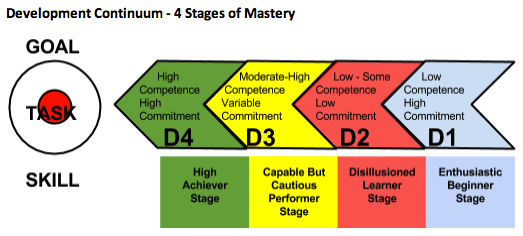In the international school community, there are many opportunities for professional development. Big international schools like mine generally hire experienced and highly trained faculty, giving educators a powerful PLC (professional learning community) to begin with. They also tend to have generous professional development budgets which enable their teachers to learn from a variety of courses and conferences. A teacher in such an organization has many options if they want to continue to develop.
Of course, with these opportunities come challenges in any educator’s development, which could vary depending on the individual circumstances as well as the school. Ken Blanchard describes four stages that a professional might be in at any given time of their career, depending on the situation, as shown in the graphic below.

Blanchard holds that personal and professional circumstances/experiences affect the level of competence and commitment one might have in any given situation in their career. For educators, PLC’s are a great way to inspire and support strong commitment as well as increasing competence.
Reflecting on my own development, I realize that experienced educators who spend an extended time in one organization may move from D4 to D3 if they don’t reach out beyond the bubble of their own organization. It could be that things are going really well, and it would be easy to leave a well-oiled machine alone. Except that even well-oiled machines can be outperformed by newer models and upgrades. If things are going really well with the status quo, then this is an indication to branch out and take things to the next level; not to mention the fact that international educators should strive to be globally informed! There is a powerful argument for educators to reach out to find the PLC or PLC’s that will help them best develop!
Over the past two years, one of my goals was to extend my PLC in the hopes of learning as much as possible about how teachers in PYP schools are approaching literacy instruction. In this endeavor, I’ve had the opportunity to engage in a multitude of face to face as well as virtual conversations, and I’ve been exposed to a plethora of resources. I have learned so much, not only about literacy and the PYP, but about education in general, and I am filled with tons of questions to move forward with.
Many of my current and future blogs have been and will be informed by, inspired by, and a product of my collaboration with my PLC’s old and new. Here are some of the communities and resources that have, and continue to inspire me and help me grow as a professional:
- My ECIS Literacy Coaches Cohort–a group of phenomenal international educators who have learned and collaborated together since 2010.
- The Principal’s Training Center–my classmates and facilitators and the many resources on change management and curriculum that they introduced me to.
- Adam Hill–a fellow PYP teacher and blogger and the #pypbookstudy group that he started.
- My Grade 4 Team-because collaboration really is better than isolation and everything we do for our students is better because of the team and the talented individuals who contribute to it every single day.
- Paul Solarz–his book Learn Like A Pirate brings a fresh voice to student-centered learning.
- Lois Lanning–her book Designing a Concept-Based Curriculum for English Language Arts: Meeting the Common Core With Intellectual Integrity, K–12 , along with her work with Lynn Erickson has been perhaps one of the most inciting resources as I consider how best to marry the philosophy and practices of the TCRWP with the philosophies and practices central to the PYP.
- The “Sharing the PYP” blog-a blog hosted by the IBO and contributed to by #ibpyp teachers around the world.